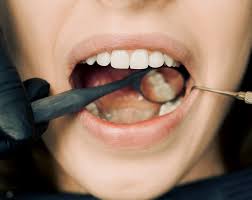
The Hidden Culprits: How Diet and Stress Impact Tooth Sensitivity
If you’re experiencing tooth sensitivity, it’s essential to consider the role of diet and stress in exacerbating this painful condition. Our experienced dentist in Logan Lake, BC, recognizes the complex relationship between lifestyle factors and oral health. A balanced diet and effective stress management can significantly alleviate tooth sensitivity, while a poor diet and chronic stress can aggravate it.
By understanding how your daily choices impact your teeth, you can take proactive steps to prevent sensitivity and maintain a healthy, radiant smile.
Understanding Tooth Sensitivity
Tooth sensitivity, also known as dentin hypersensitivity, is a common dental condition characterized by sharp, sudden pain or discomfort in response to various stimuli, such as temperature changes, sweet or sour tastes, or pressure on the teeth. This sensitivity occurs when the enamel, the protective outer layer of the tooth, wears down or becomes damaged, exposing the underlying dentin, reaching the nerves, and triggering pain.
Dietary Factors Contributing to Tooth Sensitivity
Diet can have a significant impact on your oral health. The following aspects can lead to tooth sensitivity:
- Acidic Foods and Drinks: Consuming acidic foods and beverages, such as citrus fruits, tomatoes, sports drinks, and soda, can erode tooth enamel, leading to sensitivity.
- Sugar and Refined Carbohydrates: Bacteria in the mouth feed on sugar and refined carbs, producing acid that damages teeth and causes sensitivity.
- Hard or Crunchy Foods: Chewing on hard or crunchy foods, like ice or hard candy, can crack teeth and expose nerves, leading to sensitivity.
- Caffeine and Tea: Excessive consumption of caffeine and tea can lead to tooth erosion and sensitivity.
Nutritional Deficiencies and Tooth Sensitivity
- Calcium and Vitamin D Deficiency: Inadequate calcium and vitamin D intake can weaken teeth, making them more susceptible to sensitivity.
- Magnesium Deficiency: Magnesium plays a crucial role in tooth mineralization; a deficiency can contribute to tooth sensitivity.
- Vitamin B12 Deficiency: Vitamin B12 deficiency has been linked to increased tooth sensitivity.
The Impact of Stress on Tooth Sensitivity
Stress can have the following impact on your oral health:
- Bruxism: Stress-induced teeth grinding and clenching can wear down tooth enamel, exposing nerves and causing sensitivity.
- TMJ Disorders: Stress-related temporomandibular joint (TMJ) disorders can lead to tooth sensitivity and pain.
- Gum Recession: Stress-induced gum recession can expose roots, making teeth more sensitive.
- Hormonal Changes: Stress-related hormonal fluctuations can affect oral health, leading to tooth sensitivity.
Managing Diet And Stress For Healthy Teeth
Here’s a comprehensive section on managing diet and stress for healthy teeth:
Managing a Diet for Healthy Teeth
- Balance Your Diet: Focus on whole, nutrient-rich foods, including fruits, vegetables, whole grains, lean proteins, and dairy.
- Limit Acidic Foods: Restrict or avoid acidic foods and drinks, such as citrus fruits, tomatoes, sports drinks, and soda.
- Reduce Sugar Intake: Limit sugary foods and drinks, and choose sugar-free alternatives.
- Stay Hydrated: Drink plenty of water to rinse away acid and bacteria.
- Calcium and Vitamin D: Ensure adequate calcium and vitamin D intake for strong teeth.
Managing Stress for Healthy Teeth
- Relaxation Techniques: Practice yoga, meditation, deep breathing, or other stress-reducing activities.
- Regular Exercise: Engage in regular physical activity to reduce stress.
- Sleep: Aim for 7-8 hours of sleep per night to help regulate stress.
- Time Management: Prioritize tasks and manage time effectively to reduce stress.
- Mental Health: Seek professional help if experiencing anxiety or depression.
Additional Tips
- Regular Dental Check-Ups: Schedule regular dental check-ups to monitor oral health.
- Good Oral Hygiene: Practice consistent brushing, flossing, and mouth washing.
- Mouthguard: Wear a mouthguard if grinding or clenching teeth.
- Avoid Tobacco: Quit smoking and tobacco use.
- Limit Caffeine: Consume caffeine in moderation.
Tooth sensitivity is often more than just a dental issue; it can be a sign of underlying dietary and stress-related problems. By understanding the impact of diet and stress on tooth sensitivity, you can take proactive steps to prevent and manage this painful condition. Maintain a balanced diet, manage stress, and practice good oral hygiene to keep your teeth strong and healthy.
